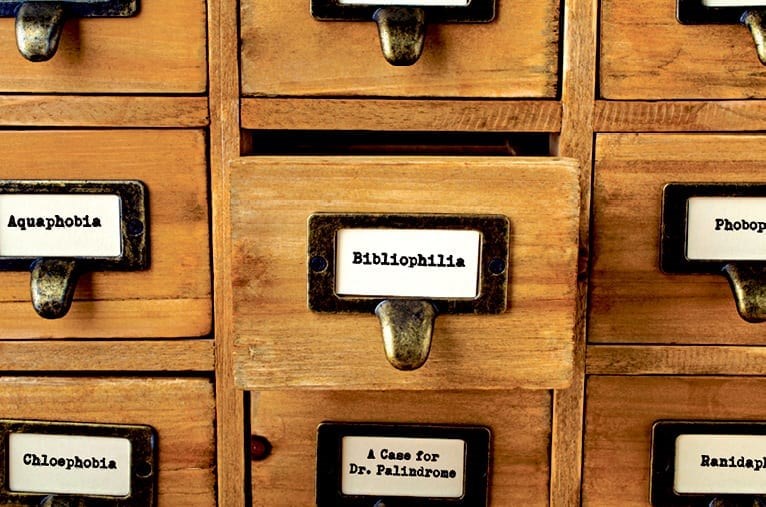Decimated by Dewey, now at home on the shelf
BY COLIN BREZICKI Special to the VOICE
As a child I felt intimidated by librarians, though I’ve come a long way since then. Now they just make me feel intellectually challenged.
It’s not their fault, I hasten to add. They never set out to terrify children. Librarians provide an invaluable service. Many volunteer their time. They have to deal with members of the public. They believe in the printed word.
It’s like being intimidated by Annie, or the Singing Nun.
So, whence this irrational fear?
Quite simply, they were once stewards of the incomprehensible Dewey Decimal System.
I remember standing utterly mystified in the library children’s section, transfixed like Lot’s wife, gazing at those arcane inscriptions on the book spines.
Eventually, I sought out a librarian.
“I’m looking for the Potter books. Can you show me where they are, please?”
It was the Beatrix and not the Harry I was after—J.K. Rowling herself wasn’t born until a whole decade later.
She pointed at the runic markings on a nearby book.
“You’re in the wrong aisle,” she said, wearing the patient smile that my Grade 3 teacher gave me when I asked if Greenwich Mean Time was a part of the day when someone was allowed to make fun of you.
“Can you show me the way to the right aisle, please?”
No one called them teachable moments back then, but she was all over this one.
“I think you can do this yourself.”
She led me to the catalogue drawer and wrote down the code for Beatrix Potter.
“Now, we’ll find the aisle that includes all these letters and numbers, and when we’ve found that, you’ll follow it to where the letters and numbers begin to look just like this. Then you begin at the top shelf and work your way down, until you find your book. It’s that simple.”
Things might have been even simpler if she hadn’t stayed to watch. I went into a blind panic.
With my face up against the books, I ran my fingers along the spines like I was reading braille, a charade to convince my examiner that her “hands-on” strategy was working. I glanced back down the aisle and nodded to assure her I had already drawn a bead on Benjamin Bunny and Squirrel Nutkin.
She nodded back, then departed, satisfied she had fed a village by teaching a child to fish.
My father used the same method when he thought it was time I learnt to swim like one. One day he tossed me out of a boat into water that was way over my head—like the Dewey Decimal System—in the belief I would surface straightaway and slice through the waves like Mark Spitz.
Instead, I sank.
All the way to the bottom.
He had to dive in and haul me back up.
I don’t blame my father, or the librarian. It was the way back then. Long before Nike invented the slogan, you were told to “Just Do It.”
Unless you couldn’t.
I can swim now, in spite of my lesson, but I’m still nervous around water.
And libraries.
Years later, I was relieved to discover that my fear, related to something called bibliophobia, is fairly common. There’s even a Multidimensional Library Anxiety Scale to measure it.
A recent study at an American university—researchers tell us there is now nothing that hasn’t recently been studied—found that 75 to 85 percent of English students suffered from library anxiety. Causes include library size, the sheer volume of books, students’ own feelings of inadequacy—and, yes, librarians themselves. It’s pathetic, I agree. Embarrassing.
All the same, I chose avoidance therapy and started going to bookstores.
After decades of buying books, I’ve accumulated a sizable library of my own. What that cost me would buy a small yacht, though I’m happier with the books because being near water is still a problem.
Library membership wouldn’t have worked for me in any case. Having to return a book is not something I could easily do.
Occasionally, I examine the un-coded spines on my shelves, recalling how a particular book made me smile, or taught me something, or helped me make sense of who I am and what it means to live in this world.
My books have become fellow travelers in my journey, sources of sweetness and light, humour and distraction, and so I’m reluctant to part with them.
I do cull them from time to time, the ones I couldn’t finish, or didn’t enjoy, and donate them to my local library. The librarians smile when I appear with a box of books, and I’m able to smile back now.
Recently, I wrote a book myself, and after it was published I took a copy to my local library. I felt the old anxiety as I approached the main desk, clutching my book.
The librarian smiled and pointed to a counter. “Returned books go over there.”
“But I’m not returning it. I wrote this book myself, and I wondered if the library might want to, you know, have a copy.”
She looked at it and sighed. “What kind of book is it?”
“I’m afraid it’s a novel.”
“Self-published?”
“No. I have a publisher. In England. So, might the library like a copy?”
She handed me a form to complete and said they’d consider it.
My book’s in the library now, and one day I plan to go back, sign it out, and shelve my bibliophobia forever.
But I’m kind of hoping I won’t be able to find my book. Maybe someone will already have signed it out. ◆



